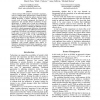Free Online Productivity Tools
i2Speak
i2Symbol
i2OCR
iTex2Img
iWeb2Print
iWeb2Shot
i2Type
iPdf2Split
iPdf2Merge
i2Bopomofo
i2Arabic
i2Style
i2Image
i2PDF
iLatex2Rtf
Sci2ools
141
click to vote
AIIDE
2009
2009
Evaluating the Authorial Leverage of Drama Management
A drama manager (DM) monitors an interactive experience, such as a computer game, and intervenes to shape the global experience so that it satisfies the author's expressive goals without decreasing a player's interactive agency. Most research work on drama management has proposed AI tures and provided abstract evaluations of their effectiveness. A smaller body of work has evaluated the effect of drama management on player experience, but little attention has been paid to evaluating the authorial leverage provided by a drama management architecture: determining, for a given DM architecture, the additional non-linear story complexity a DM affords over traditional scripting methods. In this paper we propose three criteria for evaluating the authorial leverage of a DM: 1) the script-and-trigger complexity of the DM story policy, 2) the degree of policy change given changes to story elements, and 3) the average story branching factor for DM policies vs. script-and-trigger policie...
| Added | 08 Nov 2010 |
| Updated | 08 Nov 2010 |
| Type | Conference |
| Year | 2009 |
| Where | AIIDE |
| Authors | Sherol Chen, Mark J. Nelson, Michael Mateas |
Comments (0)

